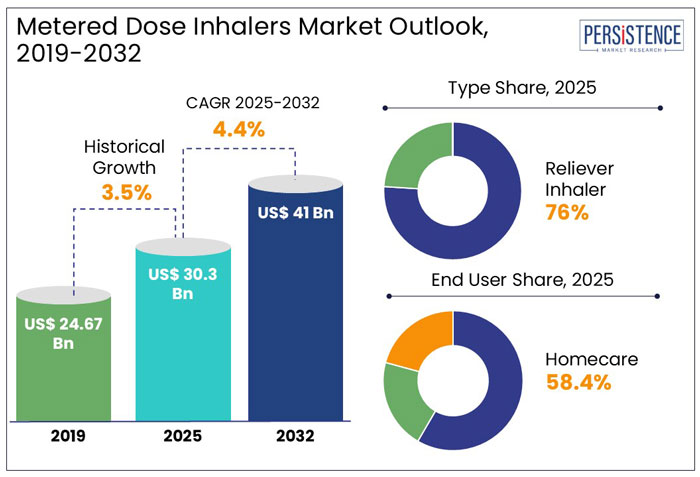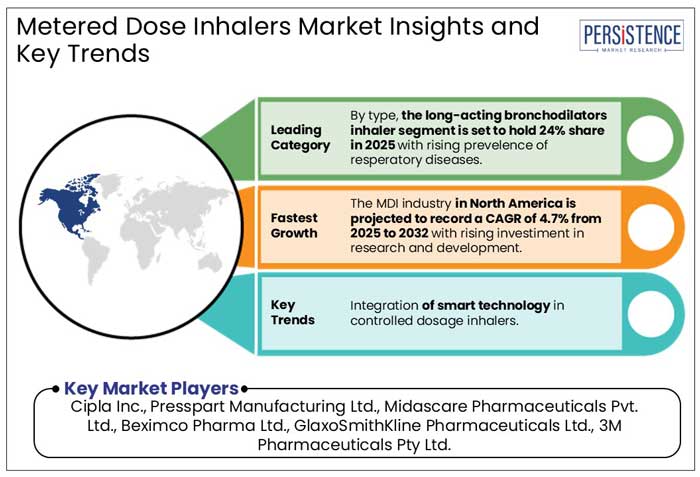Industry: Healthcare
Published Date: February-2025
Format: PPT*, PDF, EXCEL
Delivery Timelines: Contact Sales
Number of Pages: 182
Report ID: PMRREP33723
The global metered dose inhalers market size is anticipated to rise from US$ 30.3 Bn in 2025 to US$ 41 Bn by 2032. It is projected to witness a CAGR of 4.4% from 2025 to 2032.
A metered dosage inhalers are considered a significant respiratory device. Their ability to deliver a precise amount of medicine to the lungs via a brief burst of aerosolized medications is projected to boost demand.
Since metered dosage inhalers send a predetermined amount of medication to the lungs for pharmacological effect, their sales are rising worldwide.

Key Highlights of the Metered Dose Inhalers Market
|
Global Market Attributes |
Key Insights |
|
Metered Dose Inhalers Market Size (2025E) |
US$ 30.3 Bn |
|
Market Value Forecast (2032F) |
US$ 41 Bn |
|
Projected Growth (CAGR 2025 to 2032) |
4.4% |
|
Historical Market Growth (CAGR 2019 to 2024) |
3.5% |
Growing Demand for Easy-to-use Inhalers Augmented Sales from 2019 to 2024
The global metered dose inhalers industry witnessed a CAGR of 3.5% in the historical period between 2019 and 2024. Compact aerosol dispensers with active medicinal components suspended in solvents or propellants are known as metered dosage inhalers. Due to their easy use in brief bursts of fixed dosage sprays, which the patient often administers herself, demand for these inhalers is rising.
Innovation in the Controlled Designs to Bolster Demand through 2032
In the estimated timeframe from 2025 to 2032, based on the studies by Persistence Market Research, the global market for metered dosage inhalers is likely to showcase a CAGR of 4.4%. with new and improved versions of clinically tested tools and drugs, industry players are envisioned to solidify their market presence in the healthcare infrastructure. For instance,
The device is a component in the development of combination therapy inhalers for complicated treatment demands and has CE IVD approval, which guarantees dependable testing solutions.
Growth Drivers
Integration of Connected Devices to Spur Treatment Adherence in COPD and Asthma Management
The global MDI industry is expanding due to the rising use of connected devices in respiratory care and the adoption of digital health solutions. Smart inhalers, which integrate with mobile apps and cloud-based platforms, help track inhalation patterns, technique, and adherence rates.
Studies estimate that sales for smart inhalers were worth US$ 1.1 Bn in 2023 and are projected to expand as more people utilize digital solutions to treat their COPD and asthma. Medical device makers are anticipated to innovate with the designs of smart medical devices, that can cater the expanding patient pool across the globe. For instance,
Such advancements help patients better control their symptoms and allow doctors to tailor therapies for better respiratory care.
Rising Costs of Asthma Medications Limit Access to Treatment in Low and Middle-income Nations
The high cost of medications and inhalers, little knowledge of cutting-edge therapies, and a decline in investment in research and development are the main obstacles facing the asthma treatment business. The market for metered dosage inhalers which are extensively used, is hard to increase because of their high production costs and possible adverse effects.
The industry reports that the cost of asthma medications rose by 8.5% in 2023, making them more expensive for patients in low- and middle-income nations. In these regions, industry players are anticipated to boost their production with innovative treatments and products that cater to the growing patient pool. For instance,
Improving accessibility and removing financial obstacles are essential for market expansion in the forthcoming decade.
Launch of Low-cost Generic Inhalers to Enhance Accessibility for Asthma Patients Worldwide
Increased investment in research and development, improvements in inhaler technology, and more reasonably priced drug alternatives may assist the metered dosage inhaler (MDI) industry expansion. The studies estimate that the worldwide asthma inhaler market was worth US$ 20.5 Bn in 2023 and is projected to grow due to new developments. For instance,
Developing and upgrading MDI technology and pricing is crucial for greater treatment availability in light of the increased number of asthma sufferers.
Type Insights
Rising COPD Cases to Push Demand for Innovative Reliever Inhalers in the Market
The MDI market in 2025 is expected to be led by the reliever inhaler segment, accounting for 76% of the market share due to its rapid relief for acute respiratory symptoms. Short-acting beta-agonists (SABAs) like Ventolin by GSK and ProAir by Teva Pharmaceuticals continue to dominate prescriptions, especially for asthma patients requiring immediate bronchodilation.
The growing prevalence of asthma and chronic obstructive pulmonary disease (COPD) has fueled demand for quick-relief inhalers, with the World Health Organization estimating over 262 million asthma cases globally in 2023.
Meanwhile, the long-acting bronchodilator inhalers are set to grow significantly, capturing 24% of the market in 2025. Long-acting beta-agonists (LABAs) such as AstraZeneca’s Symbicort and Boehringer Ingelheim’s Spiriva are increasingly used for COPD management.
The FDA approved AstraZeneca’s Airsupra in January 2024, signaling increased investment in long-acting bronchodilators. With chronic respiratory diseases rising, the segment is set for sustained expansion in the upcoming years.
End User Insights
Rising Preference for Homecare to Spur Demand for User-friendly Metered Dose Inhalers
The homecare segment is projected to dominate the MDI market in 2025, holding a 58.4% share. The shift toward patient-centric and home-based care is driving the growth in demand, as managing asthma and chronic obstructive pulmonary disease at home offers cost savings, convenience, and better disease management.
The home-based respiratory care market expanded by 9.2% in 2023, reflecting increased adoption of at-home treatment solutions. Acknowledging such a trend, healthcare players are estimated to diversify their products to cater to homecare settings. For instance,
The hospital segment is expected to account for 32.1% of the market share in 2025, as severe respiratory conditions often require in-hospital treatment and specialized care.
On the other hand, clinics are projected to hold 9.5% of the market, providing outpatient services for patients with moderate respiratory issues. The rising preference for homecare solutions continues to drive MDI market expansion globally.

North America Sees Growth as Research and Innovation Address Rising Respiratory Diseases
North America is predicted to dominate the global metered dose market with a 34.9% share in 2025.
The rise in respiratory diseases like asthma and COPD, coupled with an aging population, is driving market development in North America due to increased research, awareness of hi-tech respiratory devices, and respiratory disorders.
Improved Healthcare Infrastructure in Asia Pacific Shows Growth Aspects
Asia Pacific is set to hold a market share of 34% in the field of metered dose inhalers due to its large population, prevalence of respiratory ailments like COPD and asthma, emphasis on early diagnosis and treatment, and increased awareness of respiratory health. Asia Pacific is envisioned to report a CAGR of 7.3% from 2025 to 2032.
Improved healthcare infrastructure and economic growth in countries like China and India contribute to the availability of innovative respiratory therapies and medical facilities. Rising middle class in the region also accelerates the adoption of MDIs, and pharmaceutical companies are actively targeting Asia Pacific. For instance,
Patient-centric Care and Novel Inhaler Technologies to Shape Europe’s Growth Trajectory
In 2025, Europe's metered dose inhalers market is projected to capture 25.3% of the total share, with the U.K. and Germany emerging as key hubs in the region. Over the period from 2025 to 2032, Europe is anticipated to showcase a CAGR of 5.4%.
Growth can be largely attributed to a surging awareness of respiratory diseases, which has led to an increasing demand for effective treatment options in the pharmaceutical and healthcare industries. For example,
Europe's extensive patient population, combined with a growing trend toward integrating metered dose inhalers with other drug delivery systems, is likely to propel the market forward. The emphasis on innovative health solutions and patient-centric care will play a crucial role in shaping the future of the metered dose inhaler market in Europe.
To keep their market supremacy, leading companies in the metered dose inhalers industry employ strategic techniques including product launches, divestment, mergers and acquisitions, and collaborations. They make substantial investments in research and development to launch cutting-edge inhaler technology, emphasizing improved medication delivery, user-friendliness, and adherence.
AstraZeneca specializes in digital health solutions, whereas GlaxoSmithKline is known for its efficacious Ellipta inhaler. Additionally, they are striving to expand around the world, focusing on areas with untapped potential and the high prevalence of respiratory illnesses. With AstraZeneca raising its market position in emerging areas, Asia Pacific is also a sizable market. Leaders in the industry use innovation, worldwide market penetration, strategic partnerships, and portfolio diversity to obtain high share.
Key Industry Developments
|
Report Attributes |
Details |
|
Historical Data/Actuals |
2019 - 2024 |
|
Forecast Period |
2025 - 2032 |
|
Market Analysis Units |
Value: US$ Bn/Mn, Volume: As applicable |
|
Geographical Coverage |
|
|
Segmental Coverage |
|
|
Competitive Analysis |
|
|
Report Highlights |
|
|
Customization and Pricing |
Available upon request |
By Type
By End User
By Region
To know more about delivery timeline for this report Contact Sales
The market is set to reach US$ 30.3 Bn in 2025.
The advancement of technology in respiratory device manufacturing is an advancement.
Cipla Inc., Presspart Manufacturing Ltd., Midascare Pharmaceuticals Pvt. Ltd., Beximco Pharma Ltd., GlaxoSmithKline Pharmaceuticals Ltd., are a few leading players.
The industry is estimated to rise at a CAGR of 4.4% through 2032.
North America is projected to hold the largest share of the industry in 2025.